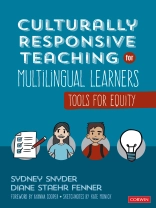What will you do to promote multilingual learners’ equity?
Our nation’s moment of reckoning with the deficit view of multilingual learners has arrived. The COVID-19 pandemic has further exposed and exacerbated long-standing inequities that stand in the way of MLs’ access to effective instruction. Recent events have also caused us to reflect on our place as educators within the intersection of race and language. In this innovative book, Sydney Snyder and Diane Staehr Fenner share practical, replicable ways you can draw from students’ strengths and promote multilingual learners′ success within and beyond your own classroom walls.
In this book you’ll find
• Practical and printable, research-based tools that guide you on how to implement culturally responsive teaching in your context
• Case studies and reflection exercises to help identify implicit bias in your work and mitigate deficit-based thinking
• Authentic classroom video clips in each chapter to show you what culturally responsive teaching actually looks like in practice
• Hand-drawn sketch note graphics that spotlight key concepts, reinforce central themes, and engage you with eye-catching and memorable illustrations
There is no time like the present for you to reflect on your role in culturally responsive teaching and use new tools to build an even stronger school community that is inclusive of MLs. No matter your role or where you are in your journey, you can confront injustice by taking action steps to develop a climate in which all students’ backgrounds, experiences, and cultures are honored and educators, families, and communities work collaboratively to help MLs thrive. We owe it to our students.
On-demand book study-Available now!
Authors, Snyder and Staehr Fenner have created an on-demand LMS book study for readers of Culturally Responsive Teaching for Multilingual Learners: Tools for Equity available now from their company Support Ed. The self-paced book study works around your schedule and when you′re done, you’ll earn a certificate for 20 hours of PD. Support Ed can also customize the book study for specific district timelines, cohorts and/or needs upon request.Зміст
Foreword
Why We Wrote This Book
Acknowledgments
About the Authors
How to Approach This Book
Chapter Overview
CHAPTER 1. WHY CULTURALLY RESPONSIVE TEACHING MATTERS
CHAPTER 2. BUILDING CULTURAL COMPETENCY
CHAPTER 3. OPERATING FROM AN ASSETS-BASED APPROACH
CHAPTER 4. SIMULTANEOUSLY SUPPORTING AND CHALLENGING STUDENTS
CHAPTER 5. PLACING STUDENTS AT THE CENTER OF THE LEARNING
CHAPTER 6. LEVERAGING STUDENTS’ LINGUISTIC AND CULTURAL BACKGROUNDS
CHAPTER 7. UNITING STUDENTS’ SCHOOLS, FAMILIES, AND COMMUNITIES
CHAPTER 8. PUTTING IT ALL TOGETHER
Appendices
Index
Про автора
Diane Staehr Fenner, Ph D, is the president of Support Ed (Support Ed.com), a woman-owned small business located in the Washington, DC, metro area that she founded in 2011. Support Ed is dedicated to empowering multilingual learners and their educators. Dr. Staehr Fenner leads her team to provide ML professional development, coaching, technical assistance, and curriculum and assessment support to school districts, states, organizations, and the U.S. Department of Education. Prior to forming Support Ed, Dr. Staehr Fenner was an English language development (ELD) teacher, dual language assessment teacher, and ELD assessment specialist in Fairfax County Public Schools, VA. She speaks German and Spanish and has taught in Berlin, Germany, and Veracruz, Mexico. Dr. Staehr Fenner grew up on a dairy farm in central New York and is a proud first- generation college graduate. She has written eight books on ML education (and counting), including coauthoring Culturally Responsive Teaching for Multilingual Learners: Tools for Equity and authoring Advocating for English Learners: A Guide for Educators. She is a frequent keynote speaker on ML education at conferences across North America. She earned her Ph D in Multilingual/Multicultural Education at George Mason Universityand her MAT in TESOL at the School for International Training. You can connect with her by email at Diane@Support Ed.com or on Twitter at @DStaehr Fenner.












